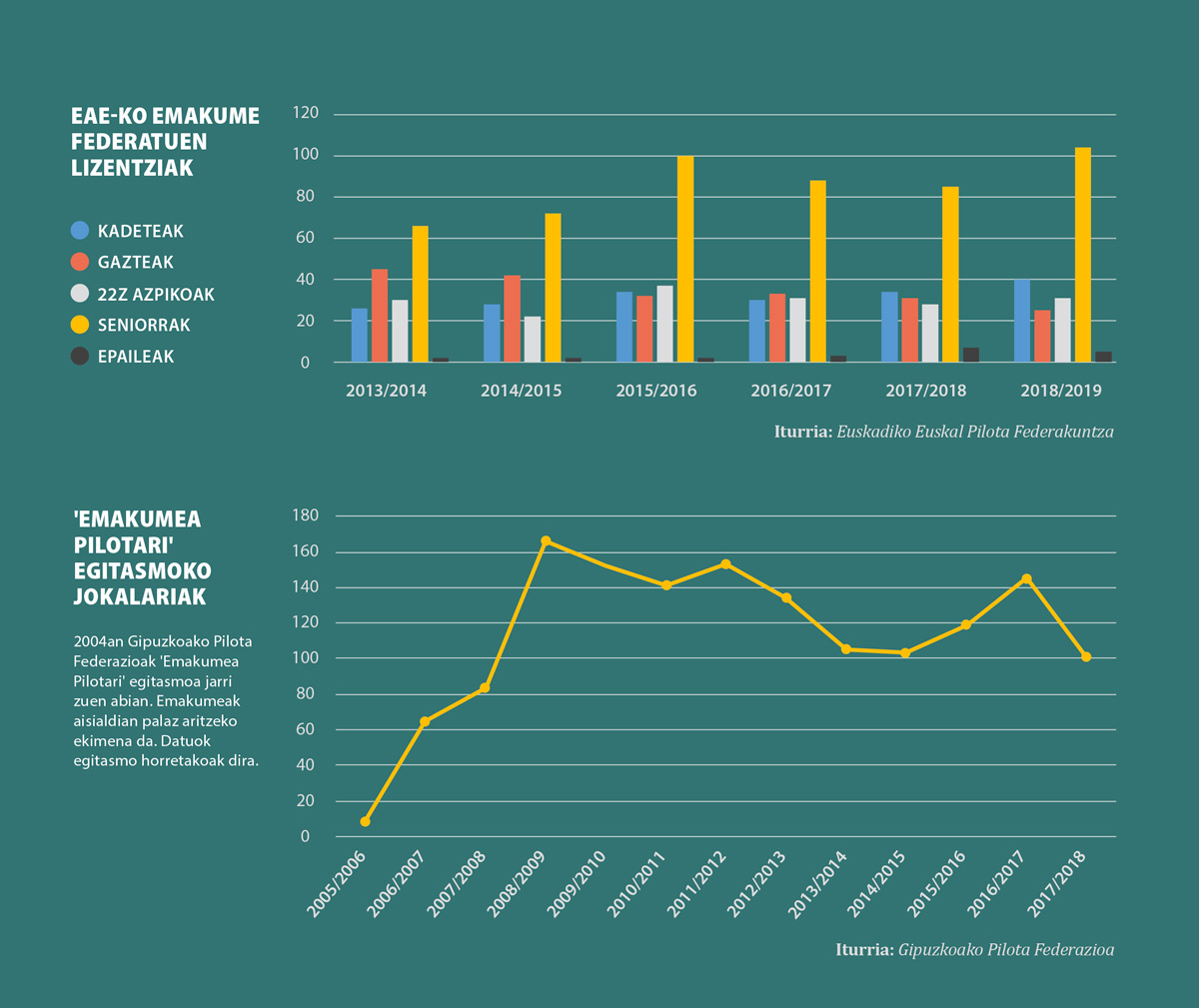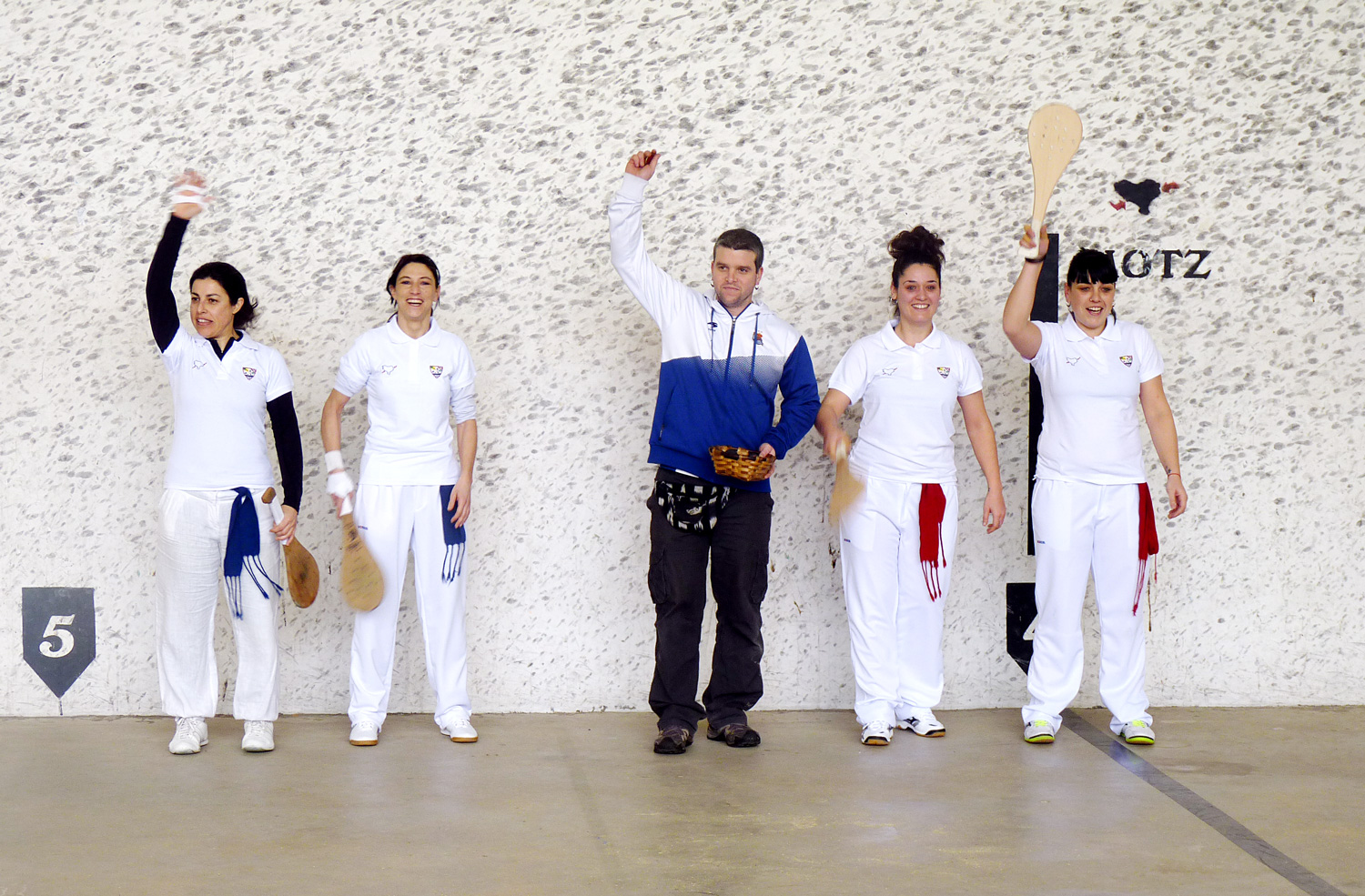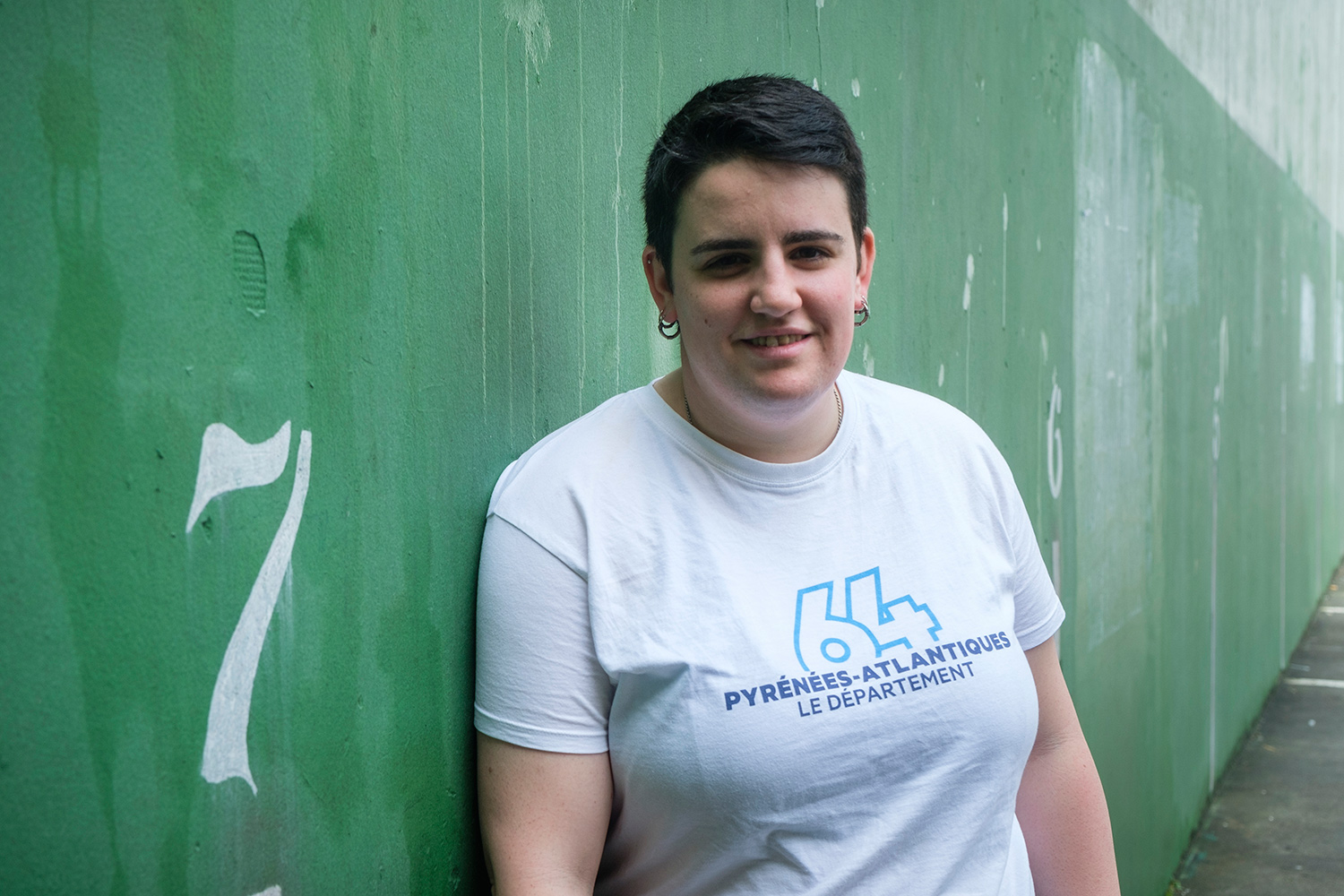Trying to measure the flowering
- All of a sudden, on the fronton and on television, we've started to see women playing handball. The Pelotaris are very happy for jumping to the front line, although they want to remember that they have played in the shadow for many years, both by hand and by shovel. There are also world champions in various game modalities, although few know. The Pelotaris Women's Association EPE has just been created to articulate the last tri-champion and to manage decent playing conditions. At the moment, they will focus on the palm of the hand and the paddle.
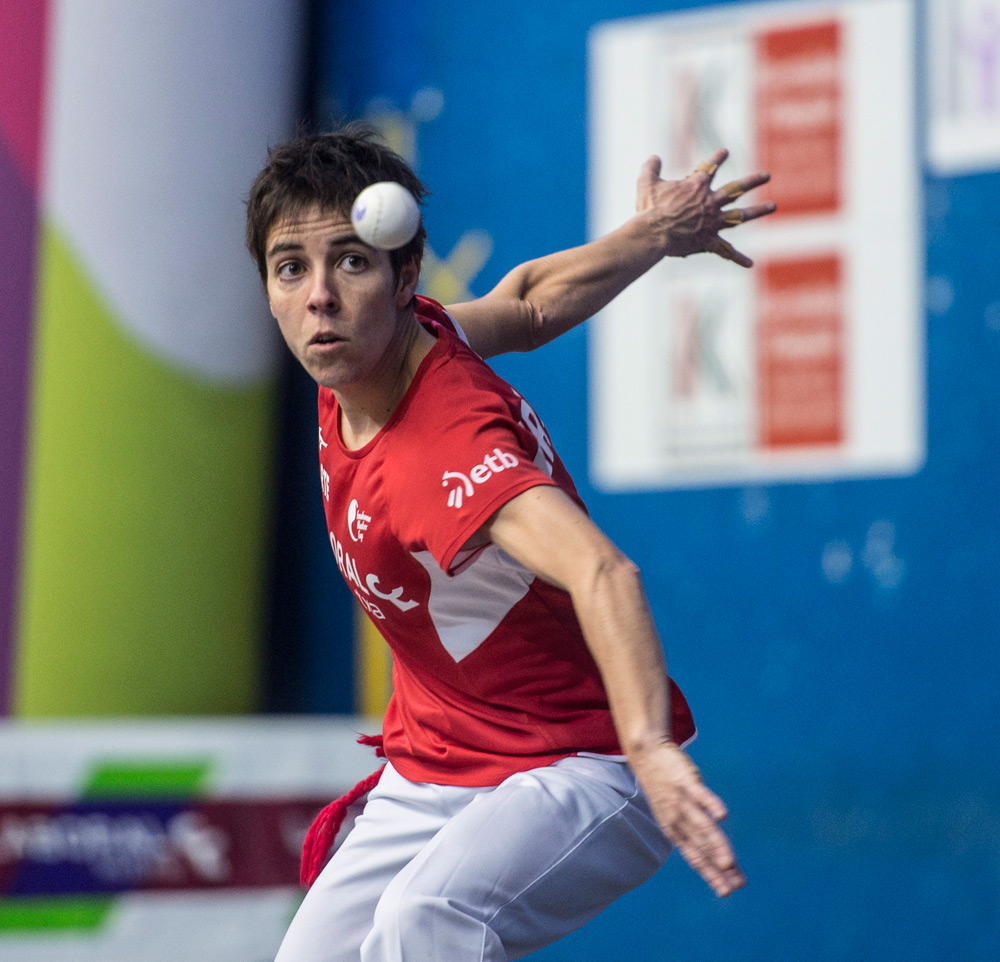
Registration for the Emakume Master Cup is now underway. They will start playing in mid-October and the finals will be held on 15 December in Barakaldo. ETB1 will broadcast them live, from 12:00. Last year, some 70 pelotaris participated. This is the third edition of the Behobia-San Sebastián. The championship organized by private hands has been a great success and has been the main reason why pelotaris women have climbed the stage.
The pelotaris have the current situation as an opportunity that should not be missed, but as always, the opponent has the reverse and here they also have the listed itokins. It is no coincidence that three or four years ago the flowering began and that the Pelotaris Women's Association was established at the end of June. The goal is to bring together players from Hego Euskal Herria and, for the time being, some 70 pelotaris have registered. To talk about the lights and shadows of today we have met with four members of the association: Patri Espinar is from Usansolo (Donostia-San Sebastián), Alaitz Badiola de Azpeitia, Garbiñe Tijero de Hernani and Maider Mendizabal de Anoeta (Gipuzkoa). They are the four players, not only by hand, but also in many other game molds. Besides playing, they have worked in almost all areas of this sport: coaches with children and federations, technification, promotion of the female ball in the federation, talks... After years of experience, you have seen that the wave of recent years cannot be left in the open sea. For Pelotaris women to be worthy, the wave has to be adapted to the needs of women.
Why are we now talking about the women's ball?
The members of OPE have summed up the success of recent years in two words: [Amarika and television]. Iker Amarika has been a professional pelotari, a technician from the Biscayan Football Federation, and is now an entrepreneur. During his participation in the Federation, he made the Emakume Cup championship, and managed to get it broadcast by ETB1. From next year, outside the Federation, as an entrepreneur, it has changed the name of the initiative and organized the Emakume Master Cup and has gained visibility year after year. The four members of the OPE have no doubt, this entrepreneur has been able to sell, has obtained subsidies from public institutions, private economic sponsorships, and one essential piece: television. Our interlocutors and many other women have worked hard to bring the pelotaris to the front line, but they have never succeeded. It's been invented by Amarika, it's ignited the wick, and public institutions and companies have taken over the shamba.
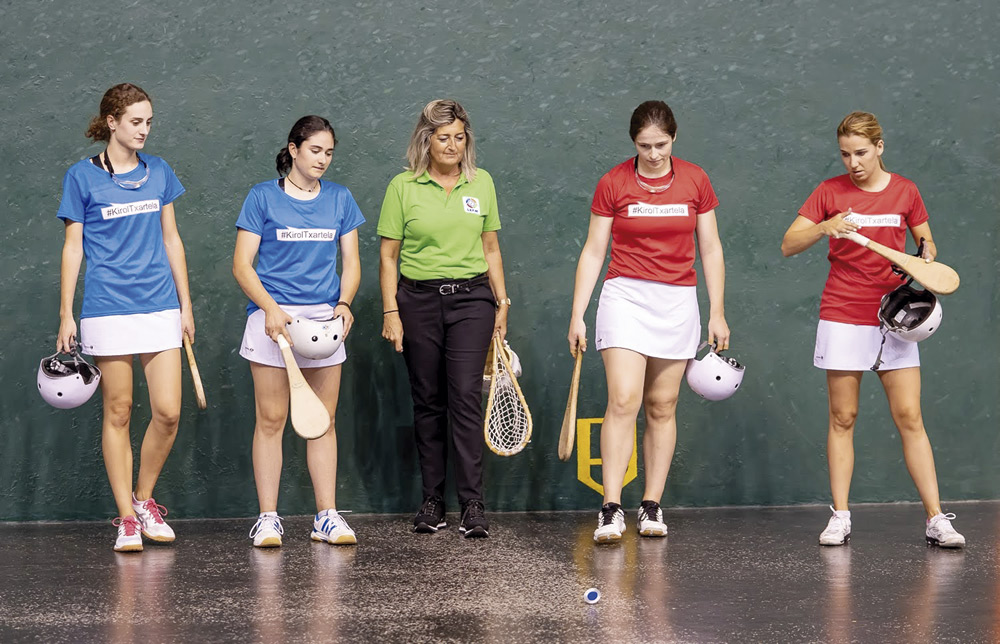
As private competitions and festivals in villages have increased, women have also emerged from under the stones. Quarry members can be divided into three groups. On the one hand, many girls played ball from when they were kids to adolescence. Without progress for women and without being able to play with the boys, who could not forcibly, they left the ball. After the current flourishing, even if they are not very young and not at the best time, they have begun to make a ball. More than one tells us that they want to take the spine as a child. Secondly, we have palists. Some who couldn't follow him, they grabbed the shovel. They are now also engaged in the paddle, even if they are not spectacular, and although they recognize that the ball by hand is not their preferred form of play, they have decided to participate in the ball mode. In the third group are the smallest, who have not had any interruption in their career. They've played hand since they were young, and the hum has caught them in their teenage years.
That professional contract of 71 euros
They are now in the window and have no intention of letting the txanpa pass. However, they start to feel as if it were a simple spectacle, as if it were a woman they often call from here and there. Patri Espinar says: “Our activity is limited to the game. We don’t make decisions, we don’t see money, we don’t set conditions.” Sometimes, the treatment is very similar: little financial money, inadequate balls, improvised organization... These issues in relation to competitions and festivals. Regarding the distribution of the focus, the members of the OPE consider that there is a lot of work to structure the ball in its entirety. They believe that dialogue should be established with public institutions and private companies and that conditions should be laid down for the practice of pelotaris to be dignified. When they say that it is necessary to structure and professionalize, they talk about technification, coaches, balls adapted to the needs of women, promotion of the ways of playing ball among children, financial compensation... More or less like boys and men.
In recent years, money has started to move in a lot of women and year after year they have realised that little has come to the Pelotaris, that public subsidies and business profits are not used to create a solid structure and dignify the activity. In the view of our OPE partners, since the partnership has begun to make its demands, some have begun to look with suspicion: “They tell us and reproach us that we want to professionalize the activity: ‘You are asking!’ Or seeing that we have played several games in summer: ‘You are picking up great.’ Even if we were getting money!”
Do not forget that for the first time they played a professional contract, when it was extended to the four winds. The media said it was a big fuss. The brow frowned when they told the event: “Professional contract? Yes, that was the case, a one-day contract and we received EUR 71. The parties were in Bizkaia and some of us left Gipuzkoa and Navarra. We don't have a diet, we pay for transportation, and it's very common to eat or have dinner in the village where you play the game, on your own account, of course. We have put the money in our pockets many times and we keep putting it.”
Tijero and Badiola give us another example of contracts. Maider Mendizabal and Patri Espinar are often cadets or juveniles. Both partners consider this to be unfair, as the young people have just begun and Mendizabal and Espinar are the world’s champions. They want to be treated less than they are and for that they think that the pelotaris themselves also have to be made aware, because there is a risk of motions becoming crazy in any condition, forgetting that in those conditions men do not play or, in other words, because they are women who are in the background.

The members of the OPE have insisted that today ' s main goal is not to live from the ball. The four are over 35 years old and do not have in mind to be professionals. Patri Espinar is the world champion and reflects on: “The men of my age live out of the ball. I've been a fan of all the sports I've practiced, and if I was a kid, I would be a professional. Today I can expect nothing but to play the world musutruk championship.” In any case, the next generations will also dream of dedicating themselves to the profession as Olaizola or Irujo, not so the veterans who have begun to fight the pelo.En as far as economic issues, have reminded the pelotaris of
Ipar Euskal Herria, who have denied any kind of irregularity. They have told us that it is another world, that they are doing it in much better conditions.
Professionals at the beginning of the 20th century
At one time, not so long ago, the Pelotaris women from Hego Euskal Herria were professionals. The former professional football player and businessman from Donostiarra Ildefonso Anabitarte tried for the first time to professionalize the Basque ball. They started with the racket ball and tennis ball, but in search of a more intense game they started using fast leather balls, for which they had to make stiffer rackets. They played from the beginning of the 20th century to the 1980s in the Spanish State and in America.
Hernaniarra Garbiñe Tijero took us from a leap to the 1990s: “Since 1990, women have been playing on a global shovel. So far, however, they have been invisible and in the last three years everything has exploded with the ball by hand. It looks like we've now started playing ball and also by hand. The Gipuzkoan Federation, for example, has organized the championship at the country level since 1990, without interruption, and with hardly any social echo. The ball has been structured at the country level, Euskadi, Spain, Europe and the world; but at the blade level. Always on an amateur, non-professional level. Some have been the best in the world, but they have been some kisses.”
Apart from those of the elite, the women’s spade project in free time has borne fruit for years. In the 2005-2006 season, the Federation of Gipuzkoa launched the Emakumeak Pilotari project. Then nine women signed up. Today the municipalities and the federation, the latter with far fewer resources than at first, manage the project. In the 2017-2018 season, run by the federation, 101 women of all ages participated. The sum of those managed by the municipalities increases easily.
There are women who want to do in ball. It is time to take measures to ensure that the wind streaks are not carried out, dignified measures, measures that equalize the activity of men and women.
Maider Mendizabal, OPE member and elite pelotari
"If my 3-year-old wants to be a pelotari, don't move like a mother."

Satisfied with the echo achieved by the Pelotaris women?
I will say yes. We would be short if we did not seize this opportunity. However, I have a few thorns to do in recent years.
Which ones?
The journalist's last question, after winning the paddle tournament, was always: “When are women in professionals?” The question irritated me. Why by hand? Why not shovel, tip basket or share? There's a ball in the media by hand, so people are looking at the handle. When the Emakume Cup [antecedent of the Emakume Master Cup] was organized, I wasn't very happy. They weren't the best pelotaris, and in addition, the media said that for the first time, federated women played by hand, and they weren't.
It wasn't.
Those of my age [41 years] played 30 years ago by hand! I despaired the ball. The kids next to me had a mustache escaped and I couldn't contradict myself, although it was technically better. For 60-70 years, the hand has been driven and we see the ball by hand, but before, there were front line players and players.
You've left the ball by hand and you've been shovel. In the elite and without a quarter of the current echo.
Now you know me on the street and, "Wow! It’s pelotari!” they say. I've been playing ball for 30 years! I've become famous because I've come to the end of the Emakume Master Cup and I've appeared twice on television. And something else. I am and we are with a better shovel than with my hand.
What do you mean?
I have already told you that the interest that has been created by the women’s ball cannot be lost and if it is by hand it is by hand. However, we women have a better level of shovel than of hand, and that too we will have to say.
What do you mean when you say you want to professionalize yourself?
It's the beginning of a process. If my 3-year-old wants to be a pelotari, to have a structure, to have made a path. Similar to other women's sports. Don't move as a parent: players, coaches, pickers and also sending notes to the media. We're hearing that now we want to be professionals. If we have been playing without charging for all our lives! I do not ask for them to enrich me, but they do receive what I am entitled to. Once we made the car trip for an hour and a half, we had as spectators my family and the parents of a pelotari. They gave me half a cheese and a bottle of wine. I don't want to go home like that. No, please, I don't like cheese or wine.
